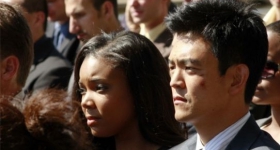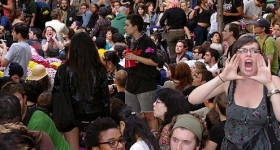Tammy and Victor Jih are really tall.
As promised, I attended Richmond Area Multi-Services (RAMS') 35th Anniversary Gala on May 12th. Themed "Changing Reality: the Voices of Asian American TV Stars," RAMS sought to connect reality television to mental health. So that night, TV show champions Tammy and Victor Jih (Amazing Race, Season 14), Chloe Dao (Project Runway, Season 2), Chef Hung Huynh (Top Chef, Season 3) and Dr. Pamela Ling (Real World, Season 3) took the stage. They were introduced by Senator Leeland Yee, who called the panel "one large group therapy."
What actually struck me most was how every star seemed surprised to be there. Meaning, for each it had come as a surprise that other Asians and Asian Americans were so interested in their success stories. Senator Yee asked if any of the shows' producers had pushed stereotypically Asian narratives onto them, and Chloe said no, except that there was this other competitor who was Asian, and "They would ask me if I felt like a sister to her, and I was like..." But Chloe was so focused on the competition, she didn't give it much thought.
Victor replied that his primary worry had not been about his portrayal of Asian-ness. It was more about being a lawyer. He was told before joining the show, "Just don't embarrass yourself or the firm," and felt very aware of that possibility. Later during, when asked how the shows had impacted them, Dr. Ling spoke eloquently about another contestant who had joined Real World to promote AIDS awareness. Knowing him had profoundly influenced her work. She said nothing memorable about any sort of Asian American awakening. And so on. It seemed that all the competitors had been more concerned with representing themselves, their professions, or just learning something, not so much their race. For me, this was an interesting implied delineation.
The conversation traveled, obviously, and there was no overarching story for me to trace. Senator Yee kept trying to bring the conversation back to Asian representation, and the discussants kept saying things about their childhood that, to them, didn't have much to do with being Asian. (Wait, maybe that was the storyline.) Chloe claimed to have had an all-American childhood replete with flat-top and Madonna clothing, "except my mom was making it for me." When asked about his parents' reaction to being on Top Chef, Hung merely said, "Well, my parents are both chefs. I knew I had to win or I couldn't go home."
Tammy and Victor, for me, were the only two who had auditioned with even mildly "Asian American" intentions. Victor needed to do something crazy. He had always done the "right thing," and now he was a big-shot lawyer. So his parents couldn't really object. "They just told me not to get fired," he said. And Tammy wanted to prove herself to her big brother. But she also stated that her little sister issues became a point of universal connection between her TV persona and her viewers. She had a brother, and she needed to work stuff out with him, just like everyone else.
But universality is tricky business, because just when you're getting ready to say, "We're all human and we're all alike," something goes down. Senator Yee, in one of his many attempts to bring the discussion back to Asian issues, mentioned that having Asian faces on reality television is, historically speaking, pretty "fresh." When he was coming of age in the 60's (sorry senator, giving you away) the primary on-screen depiction of Asians was Fu Manchu, an evil master-mind archetype. And now: Asian reality TV stars. In response, Tammy busted out with an observation that while she had experienced no overt racism, she did grow-up in a predominantly white neighborhood. And somehow it had never occurred to her that someone like her could be pretty. And then Pamela chimed in and said that yes, she did have a sort of radar for Asians on TV. In fact, she looked down the row towards Victor and Tammy, "I watched you guys."
Victor Jih commented at the beginning of the discussion that when he had first received the invite, he had been mildly offended: "I was like, what does my being on reality TV have to do with mental health?" I think the answer came when Senator Yee asked about how their parents had reacted to their choices. Chloe replied, laughingly, that her mother still asks if she can be a lawyer. But she added that her mother also sees, now, that she loves her work and is happy for her. Victor said that it was his mother who had changed the most, not him or Tammy. At the beginning there had been some concern about shame, about "airing family secrets." But now she had watched the show about thirty times, and all her friends had watched the show about thirty times. And her new mantra is, "So good to know who you are!"
And as I was sitting in the back of the room, stirring the ice in my water, something started happening. I started feeling stuff. And I think it was hope? I think it was something like hope. Because despite taking piano lessons as a kid and being from Houston like Chloe, and despite also feeling like I had to grow-up and become "successful," whatever that means -- I felt very little kinship with any of the people onstage. And to me, this meant that I could go home and know myself too. And that would be a very Asian, American, and Asian American thing to do.
Group therapy is alright.









Comments